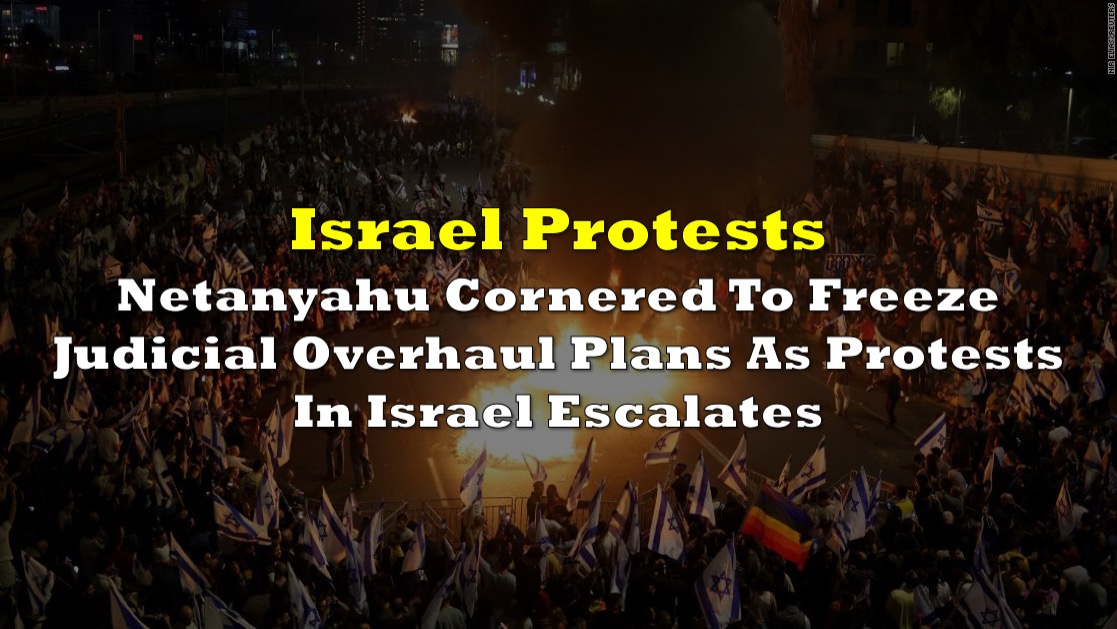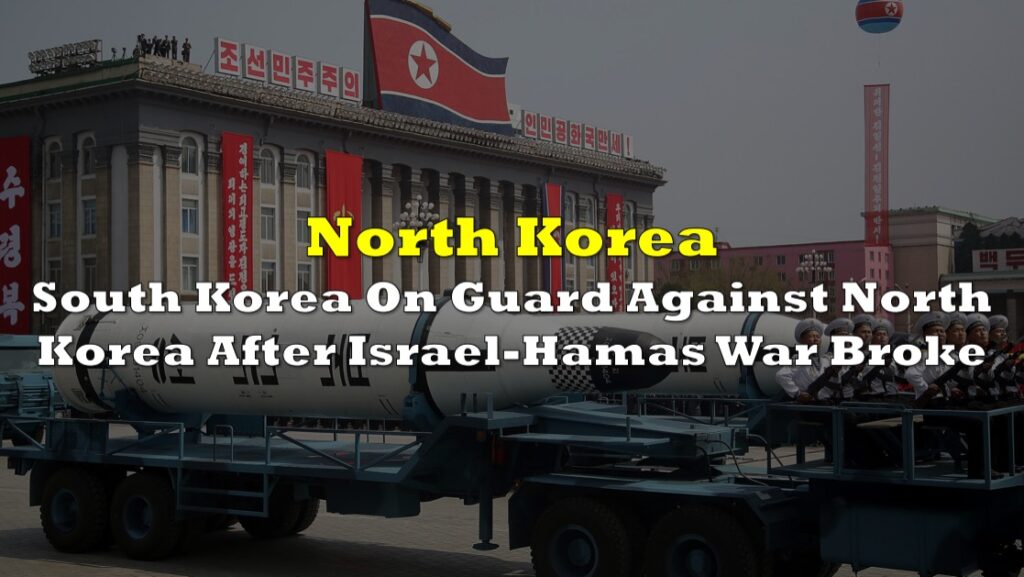After 12 weeks of mounting political crisis, Israel’s embattled Prime Minister, Benjamin Netanyahu, is expected to call a halt to his far-right government’s proposals to revamp the court.
״כולנו עם אחד״, והוא באיילון. צילום אור אדר pic.twitter.com/uFcKzztQQT
— Ben Caspit בן כספית (@BenCaspit) March 26, 2023
On Monday morning, hospitals, universities, and the country’s largest labor union declared a countrywide strike, while Tel Aviv’s airport, Israel’s principal international gateway, began canceling flights. Municipal governments, nurseries, governmental officers, and tech professionals have all joined the protest.
BREAKING: All universities across Israel will declare a strike starting tomorrow – KANN
— Faytuks News Δ (@Faytuks) March 26, 2023
Dozens of doctors in Israeli hospitals have announced their intention not to come to work tomorrow "due to illness" following the dismissal of Israel's Defense Minister – JPost
— Faytuks News Δ (@Faytuks) March 26, 2023
Dozens of Israeli mayors and heads of regional councils will start a hunger strike tomorrow https://t.co/iA77GW1neO
— Faytuks News Δ (@Faytuks) March 26, 2023
The strikes follow a night of protests spurred by Netanyahu’s decision to fire his defense minister for rejecting the judicial plans, and they build on strong opposition from Israel’s military, its critical hi-tech sector, as well as its US allies.
As calls for Netanyahu’s resignation grew from across the government, business sector, and opposition, including from Israeli President Isaac Herzog and Netanyahu’s longstanding lawyer, local media claimed that he will make a public statement Monday morning. He was expected to put a halt on the contentious legislation, which would limit the country’s supreme court’s powers, in a televised address.
For the first time in history, Israel's main union, as well as leaders from the banks and the entire business sector, are about to declare a general strike demanding that the government stop the judicial coup. Employers have committed to paying full wages to workers. https://t.co/0SW801u2P2
— נדב איל Nadav Eyal (@Nadav_Eyal) March 26, 2023
The announcement, initially scheduled for Monday morning, was postponed shortly before he was to speak, apparently due to threats from the coalition’s far-right to bring down the government if he paused the judicial overhaul.
As members of the Likud and ultra-Orthodox coalition partners appeared to have finally succumbed to months of public pressure, the extreme security minister, Itamar Ben-Gvir, urged the prime minister in a tweet that he must not “surrender to anarchy.”
The two men spearheading the judicial proposals, Likud member Yariv Levin, the justice minister, and far-right MK Simcha Rothman, who chairs the Knesset’s law and justice committee, have repeatedly vowed to press ahead with passing the most important reform laws before the Knesset adjourns for the Passover holiday on April 2.
Even as protests raged around the country overnight, a parliamentary committee continued to approve parts of the legislation, indicating that the proposals can now be read again in the Knesset plenum. Rothman urged supporters of the overhaul to march to the streets and “not give up on the people’s choice” in a tweet.
Following the mounting protests, the law committee canceled the vote on the preparation of the law that will change the composition of the Committee for the Selection of Judges in the Knesset for the second and third readings.
Breaking from the Knesset: The law Committee canceled the vote tonight on the preparation of the law that will change the composition of the Committee for the Selection of Judges for second and third reading in the knessset
— Amichai Stein (@AmichaiStein1) March 26, 2023
Judicial overhaul or constitutional crisis?
The coalition’s judicial overhaul bill would give it more power to choose judges, including those who would preside over Netanyahu’s corruption trial, in which he is indicted in three separate cases and faces jail time.
Proponents argue that the changes, which have long been sought by Israel’s increasing right wing, are necessary because the courts have grown too powerful at the expense of elected politicians and are hopelessly biased toward the country’s left-wing elite.
Opponents claim the initiatives are an attempt to remove one of the coalition’s last balances on power, allowing it to make major changes to society and tip the country toward dictatorship.
If the plans for the judiciary proceed in their current shape, Israel is likely to confront an extraordinary constitutional crisis in which the Supreme Court might overturn all or portions of the legislation intended to limit its powers, and the coalition could refuse to comply.
The plan, revealed without notice shortly after Netanyahu’s new administration gained power at the end of December, pushed the country to confront long-simmering debates about whether it should prioritize its democratic or Jewish identities.
According to a recent Channel 12 poll, only one in every four respondents supports the judicial overhaul. The administration has deemed impossible several past attempts at postponement, discussion, and compromise orchestrated by President Herzog.
“For the sake of the unity of the people of Israel, for the sake of responsibility, I call on [Netanyahu] to stop the legislative process immediately,” Herzog tweeted.
Netanyahu’s lawyer and close confidante, Boaz Ben Zur, informed the prime minister on Monday morning that he would no longer represent him in his corruption trial.
We are at a pivotal moment in Israel's history. If Netanyahu wins this battle it's hard to see any hope for democracy there. Let alone peace. https://t.co/8tY1QcH6hY
— Sam Freedman (@Samfr) March 26, 2023
The straw that broke Israel’s back
The demonstrations on Monday follow Netanyahu’s decision to replace his defense minister, Yoav Galant, after he became the first senior governing coalition official to publicly advocate for the proposals to be scrapped.
Netanyahu Fires Israel Defense Minister For Urging Halt To Judicial Reform https://t.co/vkNR9nm8SN
— zerohedge (@zerohedge) March 26, 2023
BREAKING: Israeli consul general in New York @asafzamir announced his resignation tonight after Netanyahu fires Minister of Defense Galant. “I can no longer continue representing this government”, he said
— Barak Ravid (@BarakRavid) March 26, 2023
Former IDF Deputy Chief of Staff: "I call on all representatives of Israel in embassies around the world to resign immediately. Do not serve an illegitimate government" https://t.co/QunlA8iI00
— Faytuks News Δ (@Faytuks) March 26, 2023
Evidence to the serious state of Israel at the moment. https://t.co/G2R8NGRtFK
— Evergreen Intel (@vcdgf555) March 26, 2023
Tens of hundreds of people attempted to burst through barriers outside Netanyahu’s Jerusalem house overnight in response to Galant’s firing.
Police dispersed demonstrators with mounted cops, stun grenades, and water cannons, while Israel’s consul-general in New York and Netanyahu’s defense lawyer announced their desire to resign in protest of the prime minister’s policies.
By midday, tens of thousands of protestors had swarmed central Jerusalem, forming a sea of Israeli flags and a cacophony of drums, horns, and chanting encircling the Knesset, the prime minister’s office, and the Supreme Court.
Water cannons used against protesters outside PM Netanyahu's residence in Jerusalem pic.twitter.com/cXUpDufONj
— Faytuks News Δ (@Faytuks) March 26, 2023
Past midnight in Israel:
— Moshe Schwartz (@YWNReporter) March 26, 2023
More from Ayalon Highway in Tel Aviv, Israel. Highway is completely blocked and jammed with protesters. pic.twitter.com/CxM2mHTHzg
The Israeli Labor Party has released a statement tonight that claims Prime Minister Netanyahu poses a “Severe Threat” to the Security of Israel.
— OSINTdefender (@sentdefender) March 26, 2023
The protests have also intensified from stopping the judicial overhaul to calling for Netanyahu’s resignation. As of last count, protestors on the streets have amassed to more than 600,000 Israelis.
One of the protest leaders: Our goal is to replace Prime Minister Netanyahu https://t.co/u15RYHsZJ7
— Faytuks News Δ (@Faytuks) March 26, 2023
BREAKING: More than 600,000 Israelis are demonstrating across Israel at the moment – Channel 12
— Faytuks News Δ (@Faytuks) March 26, 2023
Responding to the protests, the Israeli National Police is reportedly doubling their forces at all “stations in the country.”
Israeli police are increasing their forces at all "stations in the country". Police Commissioner has instructed police to only conduct arrests in cases of "severe violence and vandalism" https://t.co/W8lG36xTaZ
— Faytuks News Δ (@Faytuks) March 26, 2023
IDF raises alert level amidst unrest. – Israel Channel 12 pic.twitter.com/eOOLcdNOsZ
— Moshe Schwartz (@YWNReporter) March 26, 2023
Israel’s former Prime Minister Naftali Bennett lamented on the ongoing crisis, saying the country is “in the greatest danger since the Yom Kippur War,” referencing the 1973 Arab–Israeli War that left nearly 2,800 Israelis dead.
Former prime minister Naftali Bennett: "Israel is in the greatest danger since the Yom Kippur War" https://t.co/m6YnXe08sK
— Faytuks News Δ (@Faytuks) March 26, 2023
US officials have sounded off that they are “deeply concerned” about the ongoing civil unrest in Israel.
“As the President recently discussed with Prime Minister Netanyahu, democratic values have always been, and must remain, a hallmark of the U.S.-Israel relationship. Democratic societies are strengthened by checks and balances, and fundamental changes to a democratic system should be pursued with the broadest possible base of popular support,” NSC Spokesperson Adrienne Watson wrote in a statement.
Statement from US National Security Council on political unrest in Israel. pic.twitter.com/tDINQyXhaF
— Moshe Schwartz (@YWNReporter) March 26, 2023
The prime minister has apparently been attempting to engage with the opposition for several weeks, but is afraid of antagonizing his far-right coalition colleagues.
Netanyahu is in favor of stopping Israel’s judicial overhaul legislation. Israel's justice and security minister are against it. https://t.co/vjUBnyiNQf
— Faytuks News Δ (@Faytuks) March 26, 2023
Following five elections since 2019 in which voters were divided over whether the scandal-plagued Netanyahu was fit to lead the country, a coalition of extremist and religious parties led by the Likud won a clear majority in elections last November, forming the most rightwing administration in Israeli history.
If the judicial makeover is halted or abandoned, and the government falls apart, the country may be forced to hold new elections.
Information for this briefing was found via Washington Post, The Guardian, and the sources mentioned. The author has no securities or affiliations related to the organizations discussed. Not a recommendation to buy or sell. Always do additional research and consult a professional before purchasing a security. The author holds no licenses.









